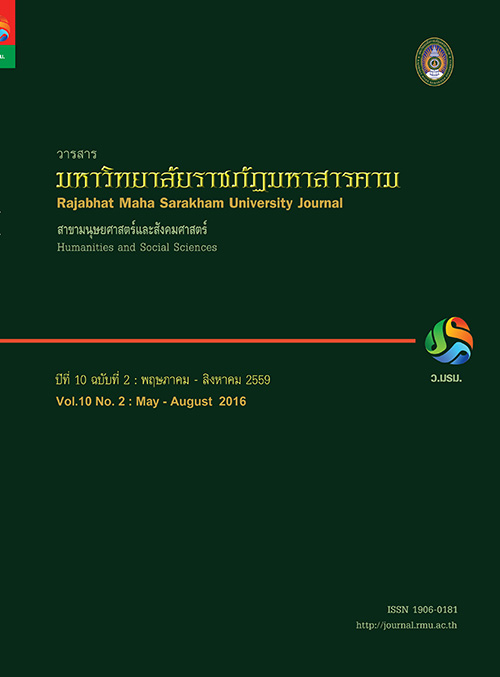การพัฒนารูปแบบการเรียนการสอนที่เสริมสร้างจิต 5 ลักษณะเพื่ออนาคตสำหรับนักศึกษา ระดับปริญญาตรี คณะศึกษาศาสตร์ มหาวิทยาลัยราชภัฏจันทรเกษม The Development of Instructional Model Enhancing Five Minds for the Future for Undergraduate Students at the Faculty of
Main Article Content
บทคัดย่อ
การวิจัยครั้งนี้มีวัตถุประสงค์ ประการแรก เพื่อพัฒนารูปแบบการเรียนการสอนที่เสริมสร้างจิต 5 ลักษณะเพื่ออนาคต
สำหรับนักศึกษาระดับปริญญาตรี คณะศึกษาศาสตร์ มหาวิทยาลัยราชภัฏจันทรเกษม ประการที่สอง เพื่อศึกษาประสิทธิผลของรูปแบบ
การเรียนการสอนที่ผู้วิจัยพัฒนาขึ้น และประการที่สาม เพื่อศึกษาความพึงพอใจของนักศึกษาต่อการเรียนตามรูปแบบการเรียนการสอน
โดยใช้วิธีการวิจัยและพัฒนามี 3 ขั้นตอน ดังนี้ 1) การศึกษาข้อมูลพื้นฐานสำหรับการพัฒนารูปแบบการเรียน การสอนที่เสริมสร้างจิต
5 ลักษณะเพื่ออนาคต 2) การสร้างรูปแบบการเรียนการสอน และ3) การทดลองใช้รูปแบบการเรียน การสอนเพื่อหาประสิทธิผลและ
ปรับปรุงรูปแบบการเรียนการสอน กลุ่มตัวอย่างเป็นนักศึกษาชั้นปีที่ 3 สาขาวิชาวิทยาศาสตร์ จำนวน 60 คน ซึ่งได้จากการสุ่มแบบกลุ่ม
จากนักศึกษาชั้นปีที่ 3 ที่ลงทะเบียนวิชาการจัดการเรียนรู้ในภาคเรียนที่ 1 ในปีการศึกษา 2557 แล้วนำมาจับฉลากจัดเป็นกลุ่มทดลอง
และกลุ่มควบคุมกลุ่มละ 30 คน เครื่องมือที่ใช้ในการวิจัย ประกอบด้วย 1) รูปแบบการเรียนการสอนที่เสริมสร้างจิต 5 ลักษณะเพื่อ
อนาคต 2) แนวการจัดการเรียนรู้ในรายวิชาการจัดการเรียนรู้ตามรูปแบบการเรียนการสอนที่เสริมสร้างจิต 5 ลักษณะเพื่ออนาคต และ
แนวการจัดการเรียนรู้แบบปกติ 3) แบบวัดจิตวิทยาการ 4) แบบวัดจิตสังเคราะห์ 5) แบบวัดจิตสร้างสรรค์ 6) แบบประเมินจิตเคารพ
7) แบบประเมินจิตจริยธรรม และ 8)แบบสอบถามความพึงพอใจของนักศึกษาต่อการเรียนตามรูปแบบการเรียนการสอน วิเคราะห์
ข้อมูลโดยการหาค่าเฉลี่ย ค่าความเบี่ยงเบนมาตรฐาน และการทดสอบค่าที ผลการวิจัยพบว่า
1. นักศึกษากลุ่มทดลองที่เรียนโดยใช้กิจกรรมการเรียนรู้ตามรูปแบบการเรียนการสอนที่เสริมสร้างจิต 5 ลักษณะเพื่ออนาคต
มีคะแนนเฉลี่ยของจิตวิทยาการ จิตสังเคราะห์ จิตสร้างสรรค์ จิตเคารพ และจิตจริยธรรมสูงกว่านักศึกษากลุ่มควบคุมที่เรียนโดยใช้
กิจกรรมการเรียนรู้แบบปกติอย่างมีนัยสำคัญทางสถิติที่ระดับ 0.05
2. นักศึกษากลุ่มทดลองมีคะแนนเฉลี่ยของจิตวิทยาการ จิตสังเคราะห์ จิตสร้างสรรค์ จิตเคารพ และจิตจริยธรรม หลังเรียน
สูงก่อนเรียนอย่างมีนัยสำคัญทางสถิติที่ระดับ 0.05 และมีความพึงพอใจต่อการเรียนรู้ตามรูปแบบการเรียนการสอนที่เสริมสร้างจิต 5
ลักษณะเพื่ออนาคตในภาพรวมในระดับมาก
The objectives of this research were to: 1) develop the Instructional Model Enhancing Five Minds for
the Future for Undergraduate Students at the Faculty of Education, Chandrakasem Rajabhat University, 2)
study the effectiveness of the Instructional Model developed by the researcher, and 3) study the satisfaction
of the students in learning activities based on the Instructional Model. The Research and Development was
applied for this research. The research process comprised of 3 stages; studying the fundamental data,
constructing the Instructional Model, implementing of the Instructional Model and finding of the effectiveness
of the Instructional Model. The subjects were 60 third year students in the science teacher program which
were clustered random sampling of students who were registered in a Learning Management course in the
first semester of academic year 2014. The subjects then divided into 2 groups and randomly assigned into
an experimental group and controlled group. The research instruments comprised of the Instructional Model
Enhancing Five Minds for the Future, course syllabus applied the learning activities based on the Instructional
Model Enhancing Five Minds for the Future and course syllabus applied traditional learning activities, test for
disciplined mind; synthesizing mind; creating mind, evaluation form for respectful mind; ethical mind and
questionnaire for students’ satisfaction in learning activities based on the Instructional Model. The data were
analyzed by mean, standard deviation and t-test.
The research findings were as follows: 1) The mean scores of students in the experimental group who
learned through activities based on the Instructional Model Enhancing Five Minds for the Future in disciplined
mind, synthesizing mind, creating mind, respectful mind and ethical mind were statistically higher than the
students in controlled group who learned through traditional learning activities at 0.05 level. 2) The mean
scores of students in the experimental group after learning through the developed Instructional Model in
disciplined mind, synthesizing mind, creating mind, respectful mind and ethical mind were statistically higher
than before at 0.05 level and their satisfaction in learning activities based on the Instructional Model Enhancing
Five Minds for the Future in overall was at a high level.
Article Details
1. บทความที่ลงตีพิมพ์ทุกเรื่องได้รับการตรวจทางวิชาการโดยผู้ประเมินอิสระ ผู้ทรงคุณวุฒิ (Peer Review) สาขาที่เกี่ยวข้อง อย่างน้อย 3 ท่าน ในรูปแบบ Double blind review
2. ข้อคิดเห็นใด ๆ ของบทความที่ลงตีพิมพ์ในวารสารมหาวิทยาลัยราชภัฏมหาสารคาม นี้เป็นของผู้เขียน คณะผู้จัดทำวารสารไม่จำเป็นต้องเห็นด้วย
3. กองบรรณาธิการวารสารมหาวิทยาลัยราชภัฏมหาสารคาม ไม่สงวนสิทธิ์การคัดลอกแต่ให้อ้างอิงแสดงที่มา


